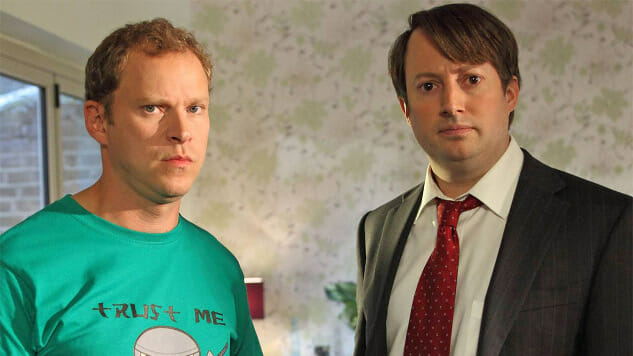The Empathy Exams: A Eulogy for Peep Show

Everyone has media that function as comfort food, old favorites we return to when we’re feeling down. I might watch Clueless or Buffy the Vampire Slayer when I’m sick, for example. When I am in a really dark place though, when I think the world is shit and I’m never going to make it, that’s when I get the urge to watch Peep Show.
Peep Show follows Mark Corrigan (David Mitchell) and Jeremy “Jez” Usborne (Robert Webb), two roommates spectacularly bad at being normal people, for nine glorious, wretched seasons. Mark and Jeremy are habitual liars, both to others and themselves. Mark plays at being a nice, mature intellectual, and Jeremy plays at being a cool, outrageous artist. They might be convincing from the outside, but by getting inside their heads, we strip away their ability to be anything but frauds.
I usually pitch Peep Show as the UK equivalent of It’s Always Sunny in Philadelphia. A simple character comedy about codependent friends turning slice-of-life problems into dangerous, outrageous, often disgusting disasters. I know a lot of edgy comedies like a roguishly terrible character, but Peep Show and Always Sunny are the only shows where I’ve seen characters kill and eat a dog . To prove a point. So they win. They win the worst contest.
More than just sharing a deranged point of view, both shows have a surprising depth and intelligence, especially when it comes to diving into their characters’ psychology. As cartoonish as the they may get, after so long a run of unblinking focus, it’s impossible to not understand these characters, to see the pain in their absurdity, and the desperation in their actions.
Part of the beauty of the POV filming in Peep Show is it makes everything look terrible. We feel how shabby the apartment is by almost never getting a good clear wide shot, and nearly every kiss or sex scene is filmed too uncomfortably close to be sexy. Nothing is glorified. While the show uses the voiceover device, it doesn’t use fantasy sequences or musical cues to clue the audience into how the characters are seeing the world; we just see the world as it is. Just like Mark and Jez, we can be in their space and not understand it. We can be so close to the people they know and yet feel nothing. We don’t switch over to Sophie’s, or Dobby’s, or Johnson’s heads, and this keeps our allegiance with Mark and Jeremy. I might be able to safely assume Mark did Sophie wrong, but I’m never going to hear her side of things, whereas I’ve heard an agonizing wealth of information on Mark’s perspective. I’ve got no choice but to identify with Mark and Jeremy, even though they are almost universally in the wrong.
When Jeremy tells Mark that getting a job would be a “kind of abuse” because he’s an artist, I am both Jeremy sincerely feeling that entitled sentiment, and Mark sincerely hating that lazy bastard. I’ve whined with Jeremy,“Why can’t I have everything I want all the time? Isn’t that democracy?” I’ve thought Mark’s thoughts, “I suppose doing things you hate is just the price you pay to avoid loneliness.” Or his bleaker, “How do I feel? Empty? Check. Scared? Check. Alone? Check. Just another ordinary day.” I may not hit their low lows, like Jeremy’s justification for cheating being, “It’s almost like a moral decision, but not really ‘cause no one will find out” or Mark fantasizing about shooting up his office followed by, “I’m probably exactly the kind of person who could end up doing something like that.” Yet even then I recognize those ugly instincts as not risqué jokes for shock value but brutal honesty. The sort of thing people really do say to themselves.
-

-

-

-

- Curated Home Page Articles By Test Admin October 21, 2025 | 3:10pm
-

- Curated Home Page Articles By Test Admin October 21, 2025 | 2:57pm
- Urls By Test Admin October 21, 2025 | 2:57pm
- Curated Home Page Articles By Test Admin October 21, 2025 | 2:55pm
-

-

-

-

-

-

-

-

-

-

-

-

-

-

-

-

-

-

-

-

-

-

-

-

-

-

-

-

-

-

-




































